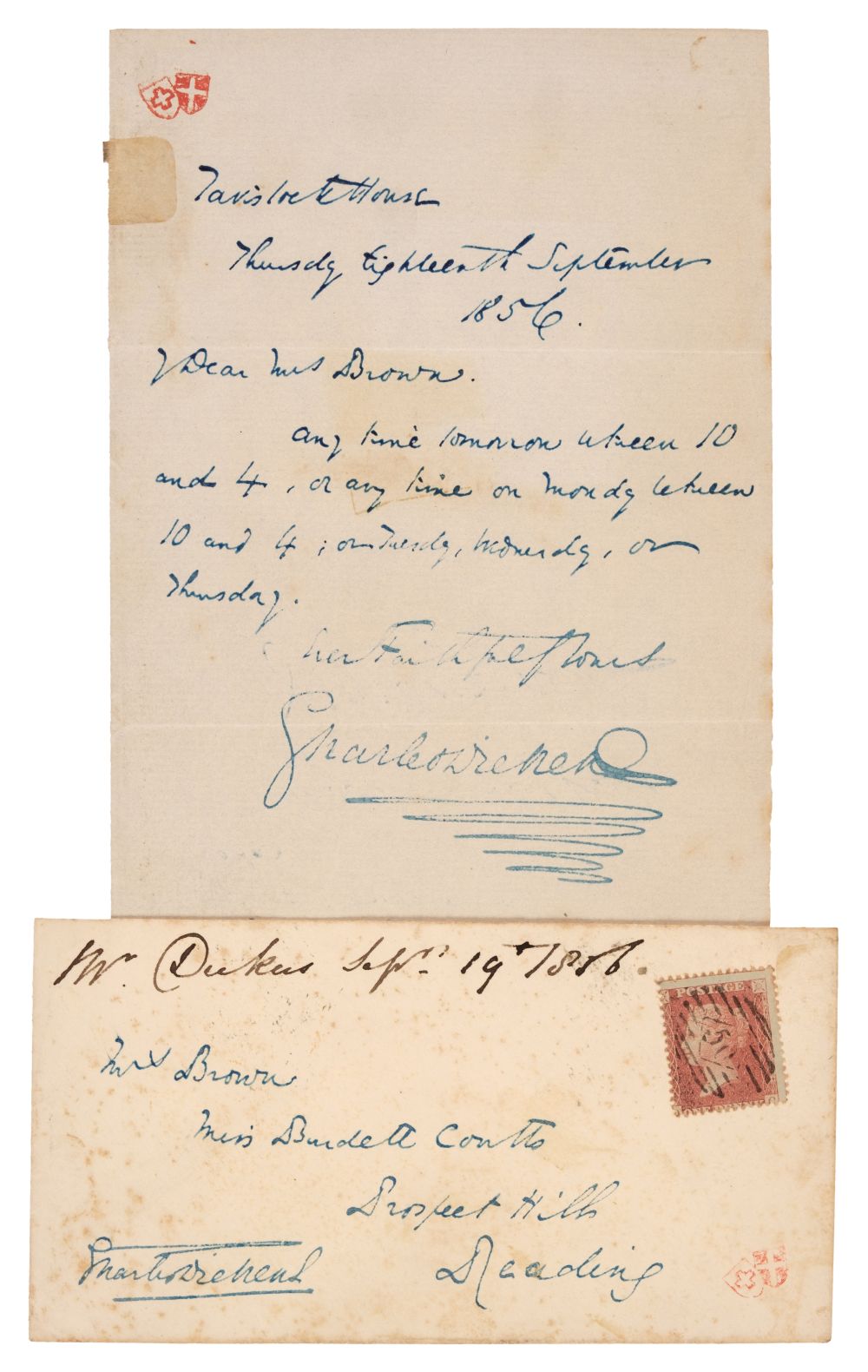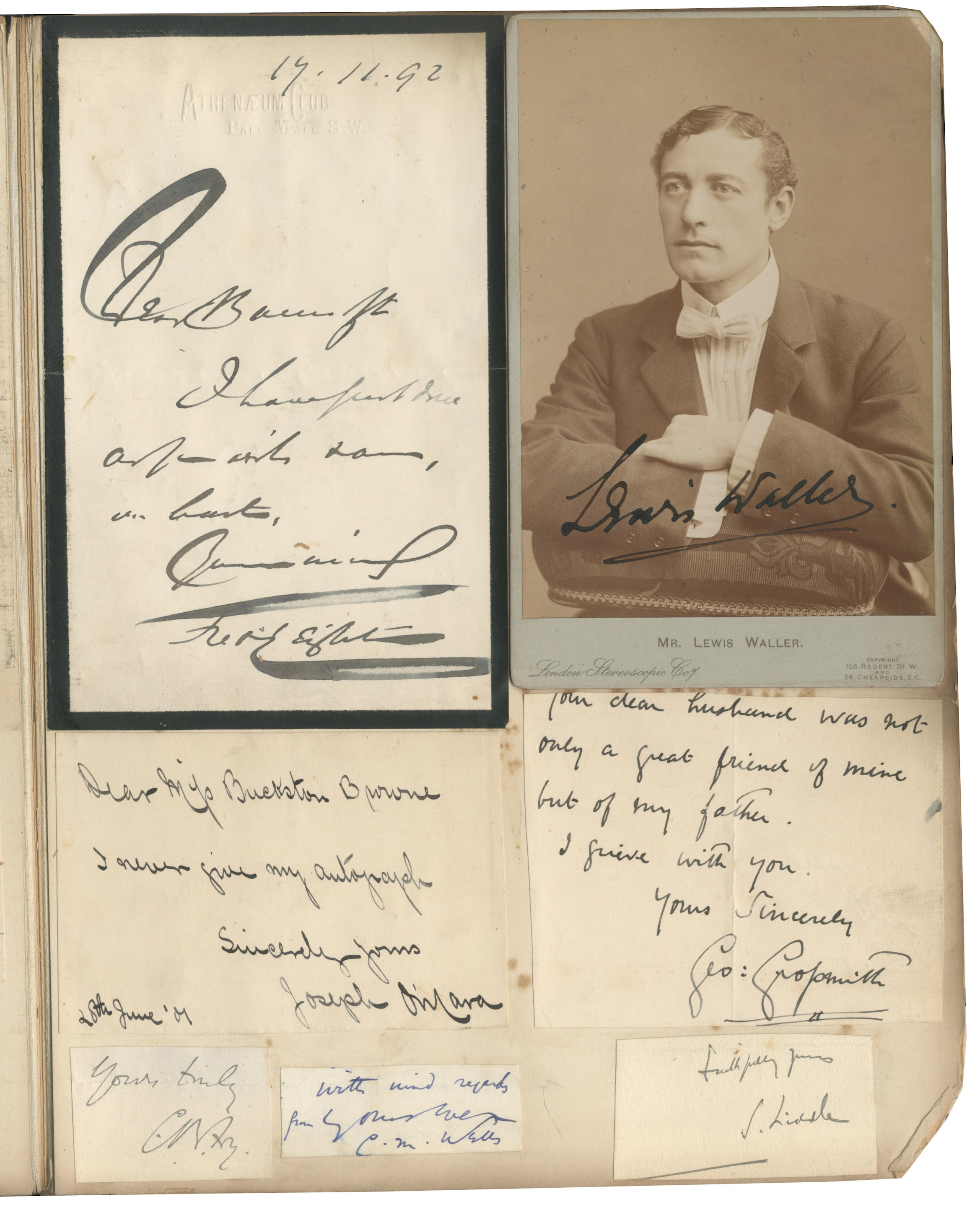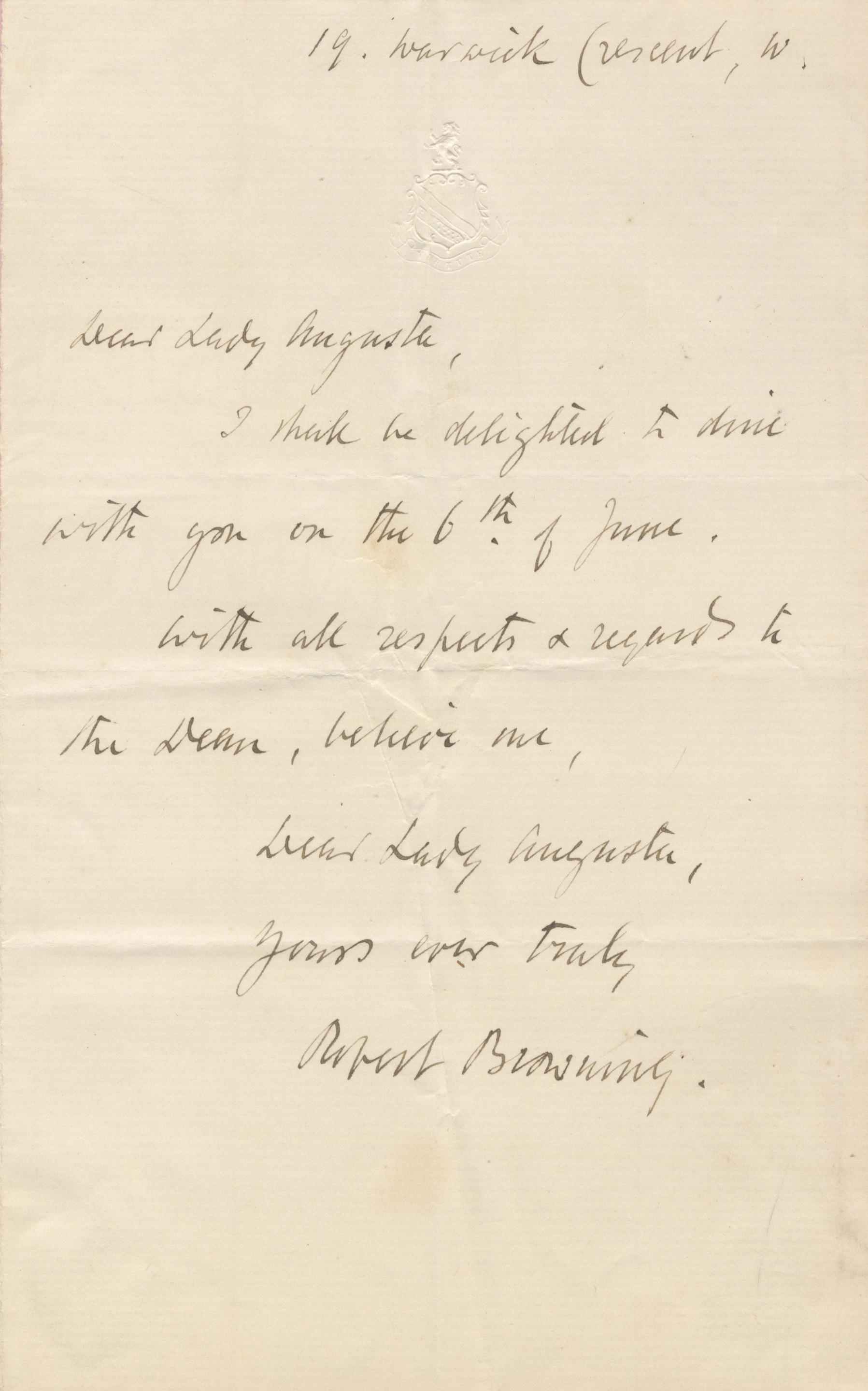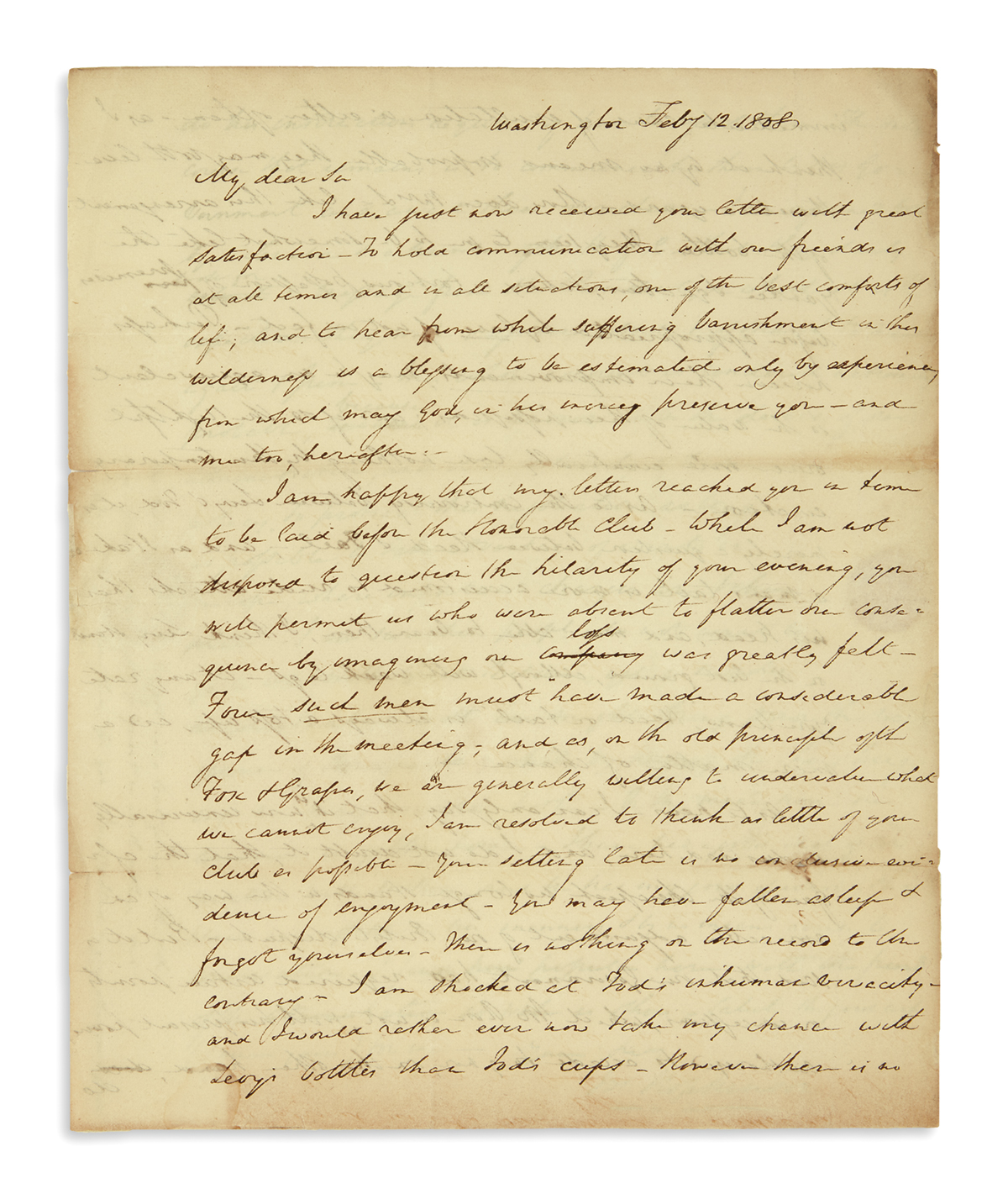Autograph letter signed from a soldier in the Pennsylvania militia sent to suppress the Whiskey Rebellion insurrectionists.
Camp near Carlisle [PA]”: 7 October 1794. 3 pp., folded sheet with integral address leaf (230 x 188 mm). Housed in a quarter cloth folding case. Condition : usual folds, hole from opening affecting a few words of text, separation at fold neatly repaired. an eyewitness account of the whiskey rebellion. In 1791, as part of Alexander Hamilton’s economic program, the Federal government issued a tax on distillers of whiskey. After several years of tension and hardships faced by farmers on Pennsylvania’s western frontier (for whom whiskey was a principal source of income), violence began spreading against the region’s tax collectors. After negotiations with the insurrectionists failed, Washington declared martial law in the region on 7 August 1794. A military force, composed of various state militias and under the direct command of Washington, Hamilton and “Lighthorse Harry” Lee, assembled and marched into western Pennsylvania. This letter is a primary document from that march. Meredith’s letter, written to Jonathan Meredith of Philadelphia (presumably his father), begins by reviewing his march to Carlisle and the fine state of his colt. The letter then turns to the suppression of the “Whiskey Boys” and gives an account of one being shot and killed: “ … I can now state facts more justly being on the spot. As to the Insurgent who was killed, his language was so abusive previous to any violence being used to him that even that might have justified it. When required to surrender, he insultingly turned and endeavored to make his escape, and it was not until after repeated charges to halt that the fatal shot was fired. The friends to the Insurgents (the whiskey boys so called) however endeavour to make a handle of this, and after failing in an attempt to use that the means of exciting the pity of government now make it a handle for initiating the minds of their party .” Meredith’s account of the firing on a “Whiskey Boy” is not terribly accurate. The event to which he refers is well documented as the first death during the suppression, occuring on 29 September 1794. “Among those rounded up,” Slaughter writes “… was a young man who was physically ill. The fellow declared his innocence and the debility that kept him from standing as directed by his captors.” Nevertheless, failing to comply with orders, the boy was shot and suffered “an excrutiating death from the wound to his groin” (Slaughter, The Whiskey Rebellion, p. 205). Meredith’s letter continues with a more accurate account of the militia suppressing the raising of liberty poles in the region and the news that George Washington intended on leading the march to Fort Pitt: “ We have head of their collecting in small bodies in different places. They have not ventured to appear before us however as yet, nor is there much reason in my opinion to fear it. We have now about 800 horse and 2 or 3000 foot, and expect to march by Friday next with the President at our head towards Fort Cumberland where the Virginia and Maryland militia are to join us in our march to Fort Pitt. Some of the Inhabitants of Northumberland County have of late become extremely riotous. They have erected their anarchy poles and I fear will require a detachment of our Troops to put a stop to their career… ” The letter concludes by discussing daily routines, military drills, loved ones at home, etc. The Whiskey Rebellion is seen as a pivotal moment in the early Republic; the first example of the Federal government exerting military control over its citizens, the suppression of the rebellion confirmed the growing power of the Federal government.
Autograph letter signed from a soldier in the Pennsylvania militia sent to suppress the Whiskey Rebellion insurrectionists.
Camp near Carlisle [PA]”: 7 October 1794. 3 pp., folded sheet with integral address leaf (230 x 188 mm). Housed in a quarter cloth folding case. Condition : usual folds, hole from opening affecting a few words of text, separation at fold neatly repaired. an eyewitness account of the whiskey rebellion. In 1791, as part of Alexander Hamilton’s economic program, the Federal government issued a tax on distillers of whiskey. After several years of tension and hardships faced by farmers on Pennsylvania’s western frontier (for whom whiskey was a principal source of income), violence began spreading against the region’s tax collectors. After negotiations with the insurrectionists failed, Washington declared martial law in the region on 7 August 1794. A military force, composed of various state militias and under the direct command of Washington, Hamilton and “Lighthorse Harry” Lee, assembled and marched into western Pennsylvania. This letter is a primary document from that march. Meredith’s letter, written to Jonathan Meredith of Philadelphia (presumably his father), begins by reviewing his march to Carlisle and the fine state of his colt. The letter then turns to the suppression of the “Whiskey Boys” and gives an account of one being shot and killed: “ … I can now state facts more justly being on the spot. As to the Insurgent who was killed, his language was so abusive previous to any violence being used to him that even that might have justified it. When required to surrender, he insultingly turned and endeavored to make his escape, and it was not until after repeated charges to halt that the fatal shot was fired. The friends to the Insurgents (the whiskey boys so called) however endeavour to make a handle of this, and after failing in an attempt to use that the means of exciting the pity of government now make it a handle for initiating the minds of their party .” Meredith’s account of the firing on a “Whiskey Boy” is not terribly accurate. The event to which he refers is well documented as the first death during the suppression, occuring on 29 September 1794. “Among those rounded up,” Slaughter writes “… was a young man who was physically ill. The fellow declared his innocence and the debility that kept him from standing as directed by his captors.” Nevertheless, failing to comply with orders, the boy was shot and suffered “an excrutiating death from the wound to his groin” (Slaughter, The Whiskey Rebellion, p. 205). Meredith’s letter continues with a more accurate account of the militia suppressing the raising of liberty poles in the region and the news that George Washington intended on leading the march to Fort Pitt: “ We have head of their collecting in small bodies in different places. They have not ventured to appear before us however as yet, nor is there much reason in my opinion to fear it. We have now about 800 horse and 2 or 3000 foot, and expect to march by Friday next with the President at our head towards Fort Cumberland where the Virginia and Maryland militia are to join us in our march to Fort Pitt. Some of the Inhabitants of Northumberland County have of late become extremely riotous. They have erected their anarchy poles and I fear will require a detachment of our Troops to put a stop to their career… ” The letter concludes by discussing daily routines, military drills, loved ones at home, etc. The Whiskey Rebellion is seen as a pivotal moment in the early Republic; the first example of the Federal government exerting military control over its citizens, the suppression of the rebellion confirmed the growing power of the Federal government.














Testen Sie LotSearch und seine Premium-Features 7 Tage - ohne Kosten!
Lassen Sie sich automatisch über neue Objekte in kommenden Auktionen benachrichtigen.
Suchauftrag anlegen